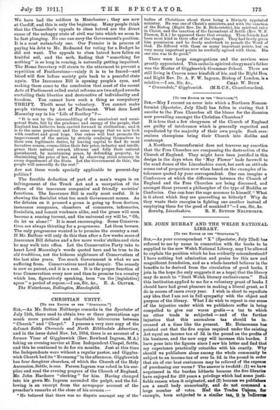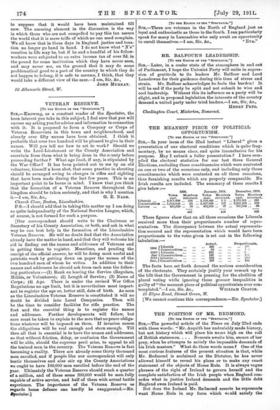MR. JOHN MURRAY AND THE WELSH NATIONAL LIBRARY.
[To THE EDITOR OF THE "SPECTATOR:1
•
SIB,—As your correspondent " X " (Spectator, July 22nd) has referred to me by name in connection with the books to be supplied to the new Welsh National Library, may I be allowed to explain the position which he has evidently misunderstood P I have nothing but admiration and praise for this new and magnificent foundation, and as a whole-hearted believer in the benefits to be derived from the circulation of good books, I join in the hope (he only suggests it as a hope) that the library may do much to " limit Welsh literary exclusiveness." Had this institution applied to me for a voluntary grant of books I should have had great pleasure in making a liberal grant, as I do in scores of cases every year. I wish in short to repudiate any idea that I am not in full sympathy with the object and purpose of the library. What I do wish to repeat is our sense of the injustice under which we publishers suffer in being compelled to give our wares gratis — a tax to which no other trade is subjected — and of the farther injustice that this anomalous tax should be in- creased at a time like the present. Mr. Heinemann has pointed out that the five copies required under the existing Act equal an income tax of 3d. in the pound on the profits of his business, and the new copy will increase this burden. I have gone into the figures since I saw his letter and find that my experience practically coincides with his exactly. Why should we publishers alone among the whole community be subject to an income-tax of over ls. 5d. in the pound in order that six of our best customers may be relieved of the expense of purchasing our wares P The answer is twofold : (1) we bays acquiesced in the burden hitherto because the five libraries have enjoyed for 250 years a privilege which had some justi- fiable reason when it originated, and (2) because we publishers are a small body numerically, and do not command s. large number of votes. Had the Trades Unions, for example, been subjected to a similar tax„it u Laiorous to suppose that it would have been maintained till now. The amusing element in the discussion is the way in which those who are not compelled to pay this tax assure the world that it is mere trifle of which no one need complain. We all know that in these days in England justice and taxa- tion no longer go hand in band. I do not know what "X's" vocation in life may be, but if he and a handful of his fellow- workers were subjected to an extra income tax of over 3d. in the pound for some institution which they have never seen, and may never see, on the ground that it may do some problematical good to a part of the country to which they do not happen to belong, it is safe to assume, I think, that they would take a different view of the case.—I am, Sir, &c.,







































 Previous page
Previous page